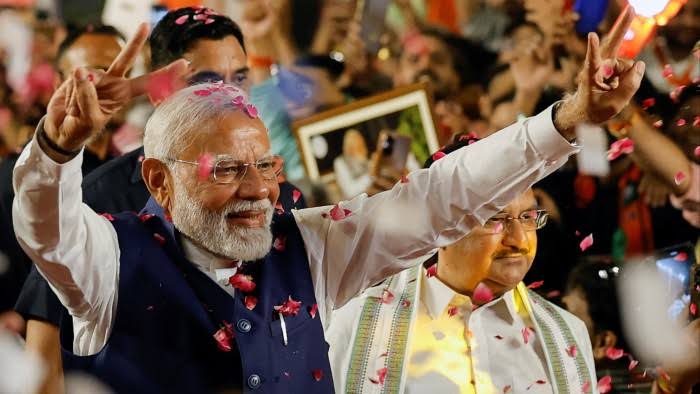
Indian Prime Minister Narendra Modi appeared poised to retain power on Tuesday at the helm of a ruling coalition, despite his Hindu nationalist party, the Bharatiya Janata Party (BJP), losing its outright majority for the first time in a decade.
This unexpected outcome unsettled investors, leading to significant market declines as emerging results indicated Modi would need to rely on at least three disparate regional parties, whose political allegiances have historically fluctuated.
Modi’s BJP had previously secured majorities on its own in both the 2014 and 2019 elections, marking an end to India’s era of unstable coalition governments. However, this time around, the necessity of forming a coalition introduces potential uncertainties in policymaking in the world’s most populous democracy.
In his initial comments since the vote count began, Modi hailed the electorate’s continued faith in the BJP-led coalition as historic. “The blessings of the people for the third time after 10 years boost our morale, give new strength,” he declared to cheering BJP supporters at party headquarters in New Delhi. Modi emphasized that despite the unity of his opponents, they had not managed to secure as many seats as the BJP.
Modi pledged to work harder and take significant decisions, highlighting sectors such as electronics, semiconductors, defense manufacturing, renewables, and agriculture as key areas of focus for his third term, though he did not provide detailed plans.
The financial markets reacted sharply to the election results. Both the blue-chip NIFTY 50 and the S&P BSE Sensex plummeted about 6%, marking their steepest election outcome day declines since 2004, when a BJP-led coalition lost power. This drop was also the worst session since March 2020 for both indexes, driven by COVID-19 lockdown concerns. The rupee fell sharply against the dollar, and benchmark bond yields rose, reflecting the unease among investors.
Foreign institutional investors sold a record 124.36 billion rupees ($1.5 billion) worth of shares, contributing to the market volatility and underscoring the nervousness surrounding the new coalition government’s potential impact on economic policies.








